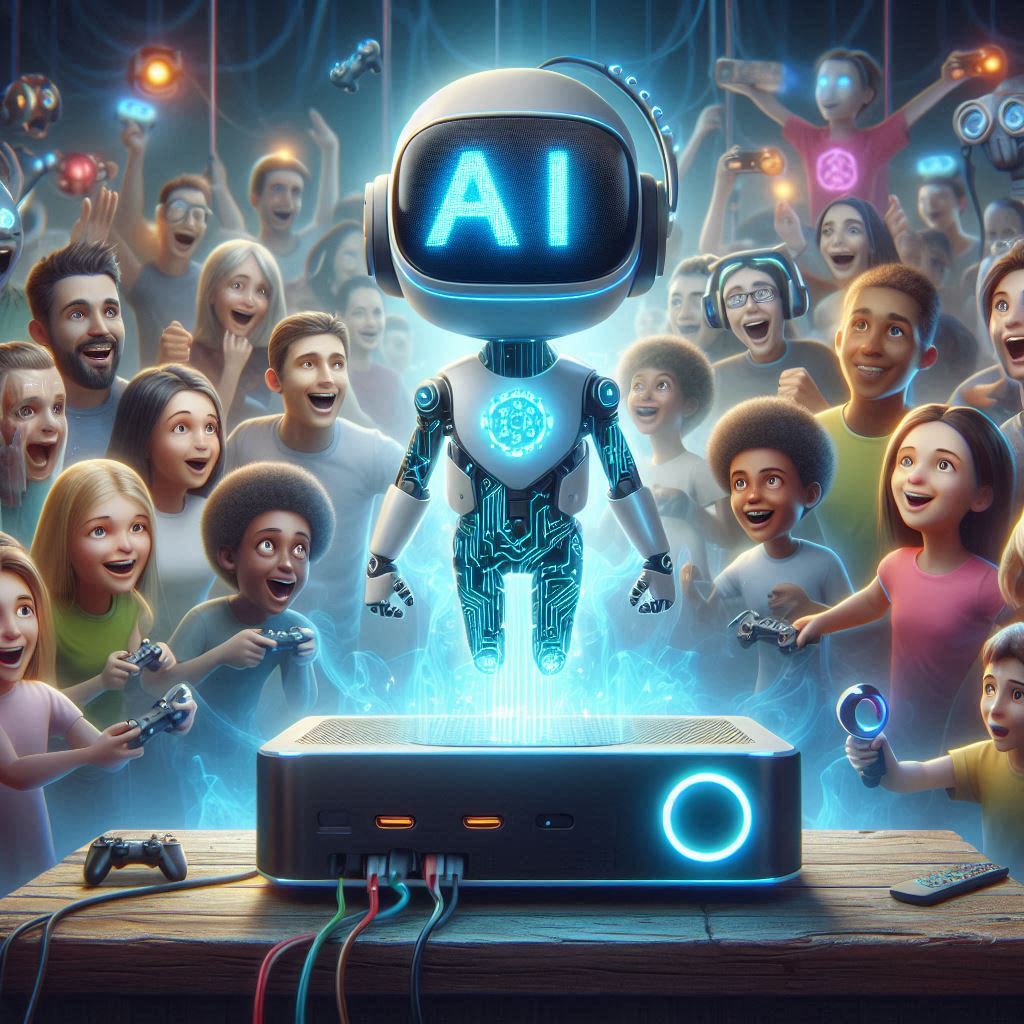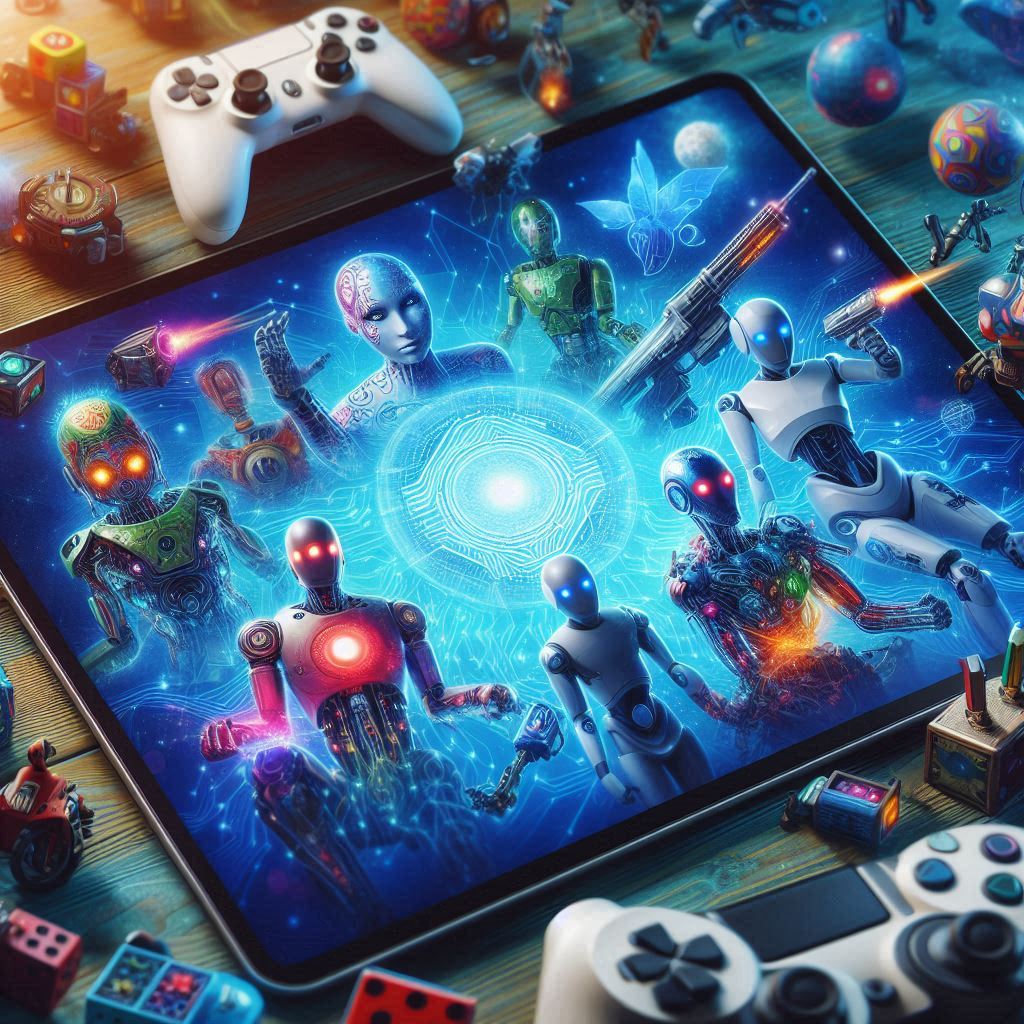Game Changers: Exploring the Role of AI in the Future of Gaming
Introduction to AI in Gaming
Artificial Intelligence (AI) is revolutionizing the gaming industry, enhancing player experiences, and enabling developers to create more immersive and intelligent games than ever before.
AI-Powered Game Development
AI algorithms are being used to streamline game development processes, from procedural generation of game content to adaptive difficulty adjustment based on player behavior.
Success Stories and Exemplary Cases
Several companies are at the forefront of integrating AI into gaming:
| Company |
AI Application |
Impact |
Source |
| Ubisoft |
AI-driven NPCs |
Enhanced realism and dynamic gameplay |
Ubisoft |
| OpenAI |
AI-generated content |
Efficient creation of game environments |
OpenAI |
| Nvidia |
AI-enhanced graphics |
Real-time ray tracing for stunning visuals |
Nvidia |
AI and Player Experience
AI is transforming player experiences by personalizing gameplay, improving enemy AI behavior, and creating more immersive virtual worlds that respond intelligently to player actions.
Challenges and Future Directions
Despite the benefits, AI in gaming faces challenges such as ethical concerns, technical limitations, and the need for continual adaptation to player preferences and technological advancements.
Conclusion
AI represents a paradigm shift in gaming, offering unprecedented opportunities for innovation and player engagement. As technology advances, the future promises even more exciting developments in AI-powered gaming.
External Links for Further Reading
Explore more about AI in gaming:
Introduction to AI in Gaming
Artificial Intelligence (AI) has emerged as a transformative force in the gaming industry, reshaping how games are developed, played, and experienced. Unlike traditional games that rely on pre-programmed responses, AI-powered games can adapt, learn, and interact with players dynamically, creating more personalized and engaging experiences.
AI-Powered Game Development
The integration of AI in game development processes has revolutionized several key areas:
- Procedural Generation AI algorithms can generate vast and unique game worlds procedurally, saving time and resources for developers while offering players expansive and diverse environments to explore.
- Adaptive Gameplay: AI enables games to adjust difficulty levels based on player skill and behavior in real-time, ensuring a challenging yet enjoyable experience for players of all levels.
- Content Creation: AI-powered tools assist in creating game content such as characters, dialogues, and storylines, enhancing storytelling capabilities and reducing development cycles.
Success Stories and Exemplary Cases
Several companies and projects highlight the innovative applications of AI in gaming:
| Company/Project |
AI Application |
Impact |
Source |
| **Ubisoft** |
AI-driven NPCs |
Enhanced realism and dynamic gameplay |
Ubisoft |
| **OpenAI** |
AI-generated game content |
Efficient creation of immersive game environments |
OpenAI |
| **Nvidia** |
AI-enhanced graphics |
Real-time ray tracing for stunning visual effects |
Nvidia |
These examples illustrate how AI is pushing the boundaries of gaming technology, from improving AI behaviors to revolutionizing graphical fidelity.
AI and Player Experience
AI technologies are enhancing player experiences in several ways:
- Personalization: AI algorithms analyze player preferences and behavior to tailor game experiences, recommending content and adjusting challenges to suit individual players.
- Realistic Interactions: AI-powered NPCs and characters exhibit more realistic behaviors and interactions, making game worlds feel more alive and responsive.
- Dynamic Environments: Games use AI to create dynamic environments that evolve based on player actions, offering a more immersive and unpredictable gameplay experience.
Challenges and Future Directions
While AI holds immense promise for gaming, it also faces significant challenges:
- Ethical Concerns: Issues such as AI bias, privacy concerns, and the ethical implications of AI-driven decisions in games need careful consideration.
- Technical Limitations: Developing robust AI that can handle complex interactions and maintain performance across various gaming platforms remains a technical challenge.
- Adaptability: AI systems must continuously adapt to changing player behaviors and expectations, requiring ongoing research and development.
Conclusion
AI is poised to transform the future of gaming, offering unprecedented opportunities for innovation and player engagement. As AI technologies continue to advance, the gaming industry can expect even more exciting developments that redefine how games are created, played, and enjoyed.
External Links for Further Reading
Explore more about AI in gaming:
Disclaimer and Caution: Considerations for AI in Gaming
Introduction
Artificial Intelligence (AI) has revolutionized the gaming industry, offering new possibilities for gameplay, immersion, and player interaction. However, alongside its transformative benefits, AI in gaming also introduces considerations and potential risks that developers, players, and stakeholders should be aware of. This section aims to provide a comprehensive overview of these considerations and offer cautionary insights into navigating the evolving landscape of AI-powered gaming.
Ethical Considerations
- Bias and FairnessAI algorithms in gaming may unintentionally perpetuate biases, affecting game mechanics, character interactions, and player experiences. Developers must ensure that AI systems are designed and tested to minimize bias and promote fairness among players of diverse backgrounds and skill levels.
- Privacy and Data SecurityThe collection and utilization of player data by AI systems raise significant privacy concerns. Developers should implement robust data protection measures to safeguard player information, ensuring compliance with data privacy regulations and fostering trust among gamers.
- Representation and InclusivityAI-driven character creation and narrative generation should prioritize diversity and inclusivity. Developers must avoid reinforcing stereotypes and ensure that AI-generated content reflects diverse perspectives and cultural sensitivities.
Technical Considerations
- Complexity and ReliabilityDesigning AI systems that maintain reliability and performance across diverse gaming platforms and hardware configurations poses technical challenges. Developers must invest in rigorous testing and optimization processes to minimize AI failures and ensure seamless gameplay experiences.
- Adaptability and ScalabilityAI algorithms in gaming must be adaptable to evolving player behaviors and preferences. Scalable AI solutions enable games to accommodate growing user bases and fluctuating player demands, enhancing long-term sustainability and player engagement.
- Security VulnerabilitiesAI-powered gaming environments are susceptible to cybersecurity threats, including malicious attacks targeting AI algorithms and player data. Developers should implement robust cybersecurity measures, such as encryption and authentication protocols, to mitigate risks and protect gaming ecosystems.
Player Considerations
- Informed Consent and TransparencyPlayers should be informed about the use of AI technologies in games, including data collection practices, AI-driven gameplay features, and potential impacts on gameplay experiences. Transparent communication fosters trust and enables players to make informed decisions about their participation in AI-powered gaming environments.
- User Experience and FeedbackIncorporating player feedback into AI development processes enhances user experience and satisfaction. Developers should prioritize responsiveness to player concerns and preferences, iteratively improving AI-driven game mechanics and features based on real-time player interactions and feedback.
- Social and Psychological ImpactAI in gaming may influence social dynamics and player behaviors, including interactions within virtual communities and real-world relationships. Developers should consider the social and psychological implications of AI-powered gaming experiences, promoting positive player interactions and responsible gaming behaviors.
Future Directions and Responsible Innovation
- Ethical AI Design PrinciplesAdopting ethical AI design principles, such as fairness, transparency, and accountability, guides responsible innovation in gaming. Developers should adhere to industry standards and best practices for AI governance, ensuring that AI technologies enhance gaming experiences while respecting ethical norms and values.
- Collaboration and Knowledge SharingCollaboration among stakeholders, including developers, researchers, policymakers, and gamers, fosters knowledge sharing and collective responsibility for AI in gaming. Open dialogue and collaboration promote innovation, address challenges, and advance ethical standards in AI-powered gaming ecosystems.
Conclusion
As AI continues to redefine the gaming landscape, addressing ethical, technical, and player considerations is paramount to fostering a sustainable and inclusive gaming industry. By prioritizing transparency, accountability, and responsible innovation, developers and stakeholders can harness the full potential of AI while safeguarding player trust, privacy, and gaming experiences.
External Links for Further Reading
Explore more about AI ethics in gaming:
This detailed disclaimer and cautionary section provides insights into the ethical, technical, and player-related considerations associated with AI in gaming. It aims to inform stakeholders about potential risks and responsible practices while promoting dialogue and collaboration within the gaming industry. If you need further adjustments or additional details, feel free to let me know!

